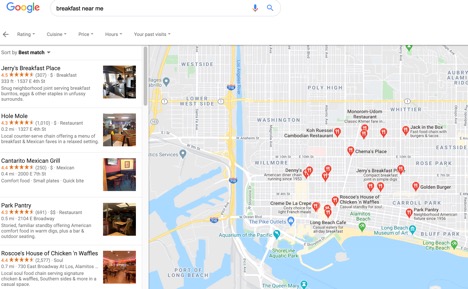What Is a Good Online Reputation Today?
Whether or not you realize it, most people are working on their online reputation. We do things in our daily lives that contribute to keeping a good online reputation.
Here are a few things that you are probably already doing that can make your online reputation better:
- Curating your social media presence
- Responding to negative reviews
- Monitoring your brand mentions online
- Promoting positive content on third-party websites
- Establishing yourself as a thought leader by regularly publishing on your own blog
A positive online reputation should be the goal of every individual or business. Even as we emerge from the pandemic, we continue to deal with the economic, financial, and social consequences. We live in a world that has now, more than ever, come to rely on the digital world and online representation.
Managing how other people perceive you is vital to a business’s survival and success. The opinions people form about you will either encourage customers to choose your business or drive them away, so you can’t afford for your online reputation to be anything less than positive.
An online reputation is defined as the way that a person or business is perceived based on the information that appears about them online. Often, it’s the first impression people get from search results or reviews.
Hopefully, that information is positive. If it’s not, then it’s time to put in some work to clean up your search results and start your journey toward maintaining a positive online reputation and reaping the benefits that come with it.
Your online reputation is so vital that a single misstep can result in a loss of revenue and trust in your brand. Also, we all know how tough it can be to change a first impression and recover. That’s why investing in your reputation while it is in good standing and building on that foundation is important.
This article will cover:
- Positive online reputation defined
- Benefits of a positive online reputation
- How to maintain a positive online reputation
Positive online reputation defined
A good online reputation is a positive perception of a person or business based on the information that appears about them online. It’s often mistaken as something uncontrollable since it is essentially the opinion people form based on what they find via Google search results, social media pages, Yelp reviews, Wikipedia, and more.
While an opinion is largely subjective, it can be shaped or molded by the actions that you or your business take to manage what appears about you online. There are also several qualitative aspects of your online reputation, like the number of stars your business has on Yelp or the number of positive search results that appear when your name is Googled. These all add to how you are perceived.
How did I decide on breakfast this morning? Reviews.
Speaking of Google, when was the last time you Googled something? For most people, it’s several, if not dozens, of times a day. Or if you’re like me, it’s constant.
Think of how many people, just this morning, Googled places to go eat breakfast. With the huge number of options, they needed to find a way to lower the number of choices. One of those ways is through reviews and what other people have said about the restaurants.
Most people probably didn’t even look at the restaurants with less than four stars!
People are Googling at an ever-increasing rate.
With 91.9% of the search engine market share, Google averages 8.5 billion searches a day, with nearly 100,000 searches a second.
Google averages 8.5 billion searches a day, with nearly 100,000 searches a second.
Another vital statistic is that 63% of these are done on mobile devices while people are on the go and making quick decisions about where to eat, what to buy, or where to shop.
In fact, it’s estimated that nearly half of all product decisions begin on Google!
With such a massive volume of searches being conducted, it’s essential to ensure that whenever someone Googles your name or business, what they see portrays you positively.
Benefits of a positive online reputation
A good online reputation can lead to higher trust, better talent, less risk, and more profit. These benefits are even more advantageous for corporations. Companies with a good corporate reputation tend to be treated better online – even given a second chance in the wake of missteps or customer dissatisfaction.
Here are some of the top benefits of maintaining a positive online reputation:
- Higher trust: If you can’t get people to trust your brand, it’s going to be difficult getting them to purchase your products or services. People tend to trust more in a brand with a good reputation and, as a result, will be more likely to purchase from them and also recommend that business to others.
- Increased profits: Companies with high star ratings and reviews get more business. Studies have shown that every additional one-star Yelp rating causes an increase in the business’s revenue by as high as 9 percent. However, studies have shown that getting those high-star reviews is becoming more difficult, as people tend to be more critical. So it’s more important than ever to work to maintain your ratings and customer satisfaction.
- Better talent: Brands with a positive reputation attract better employees. People want to work at a company that shares the same core values and beliefs as they do. They want to believe in the company and trust the business model. Having a better online reputation will lead to stronger applicants who are more likely to stick around for the long haul and give everything they’ve got to your company.
- Less risk: People move with crowds. If your reputation is bad, it can perpetuate that negative sentiment by attracting more negativity, leading to additional reputation problems. If people have a gut reaction or see that others tend to have a negative opinion, they are likelier to stay away. Appearance matters, especially when it comes to online reputation.
- Gentler treatment: Companies that share the same core values as their clientele will likely overcome a reputation scandal more easily than one without that connection. People tend to rely on their past experiences and impressions and give businesses a chance to explain and recover from missteps.
- Improved marketing: Your reputation is closely tied to your marketing efforts. A positive online reputation will help you stand out from your competitors and earn more customers, who can become repeat customers and share their positive experiences with others through online reviews, social media and even word of mouth.
How to maintain a positive online reputation
A positive online reputation can’t be constructed overnight. It is the result of careful curation over time. If you dedicate the time to improving your reputation, you can expect to see results. A good place to start is to develop (and stick to!) a solid reputation strategy.
A few key things to keep in mind to maintain a positive online reputation:
- Assess your current situation: Start by simply Googling yourself or your company. Take note of what comes up and whether your search results are mostly positive or negative.
- Monitor your search results: Keep a careful watch on what is being said about you online. Respond to comments, whether they are positive or negative. If they are negative, work to improve the problem to avoid repeating it in the future.
- Take a look at your competitors: How do they present themselves? How do they respond to reviews, both positive and negative? Is there anything you can learn from them?
- Create positive content: Focus on the channels you can control (your website, blog, and social media pages) to create positive content. Make sure it is on-brand and interesting to both your current and target customers.
- Focus on your brand: Your overall brand is key here. Be transparent, and authentic, and work from the inside out to make sure that your brand is what you say it is online.
- Address when you came up short: Sometimes companies make mistakes or get bad reviews. Make sure to be professional and address these issues. You might not need to take massive steps as these companies did, but make sure to show that you understand and face up to them. When it comes to bad reviews, here are some ideas on how to handle them.
Your online reputation is important. The tips discussed in this blog are simply a jumping-off point for maintaining a positive online reputation. When it comes to online reputation management, the work is never finished, since reputations can often change without notice. Also, public opinion and trends can change, often very quickly, so make sure to stay in touch with this. Know what the public is looking for, and while staying authentic, always be ready to deal with changes.
Whether you are just starting to build your online reputation or are facing a reputational crisis, you can work to improve your search results. If you need help navigating the process, feel free to contact us today.
Positive Online Reputation FAQs
What is a good online reputation?
A good online reputation is a positive perception of a person or business based on the information that appears about them online. This should be the goal of every business since it can lead to higher revenue, more trust in your brand, and a stronger employee applicant pool.
What are the benefits of a positive online reputation?
Your online reputation will make or break your business. A positive online reputation means that more people will trust your brand and be drawn to it. Your company will yield higher profits. Better qualified applicants will want to work (and stay working) for your company. Additionally, you will be more successful in marketing efforts and recovering from potential crises since your company is already in good standing with the public.
How do you maintain a positive online reputation?
A positive online reputation must be curated over time. There is no one-size-fits-all answer to this, but strive to maintain a positive online reputation. Assess your current situation. Monitor your search results. Consistently create positive content. Focus on building your brand.
About the author
Brianne Schaer is a Writer and Editor for Reputation X, an award-winning online reputation management services agency based in California. Brianne has more than seven years of experience creating powerful stories, how-to documentation, SEO articles, and Wikipedia content for brands and individuals. When she’s not battling AI content bots, she is cruising around town in her Karmann Ghia. You can see more of her articles here and here.
–
Tags: Online Reputation Management Services, Reputation Management.


